|
|
|
Sort Order |
|
|
|
Items / Page
|
|
|
|
|
|
|
| Srl | Item |
| 1 |
ID:
144595
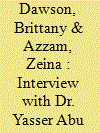

|
|
|
|
|
| Summary/Abstract |
This October 2015 interview with director of the Gaza Community Mental Health Programme (GCMHP) Dr. Yasser Abu Jamei addresses how mental health professionals care for themselves and each other in an environment with little break from sustained conflict. Mental health workers in the Gaza Strip must cope with the resource shortage generated by the Israeli blockade and their own trauma while aiding others. The United Nations Children's Emergency Fund (UNICEF) estimates that over one-third of Gaza's children require direct and specialized psychosocial support as a result of Israel's Operation Protective Edge (OPE), the fifty-day war on Gaza in the summer of 2014, and earlier assaults. GCMHP provides services free of charge at clinics, community centers, and by phone via a twenty-four-hour hotline, and since its founding, has served more than twenty thousand Gazans with capacity-building programs and trainings, community education, scientific research, and human rights advocacy. GCMHP provided mental health support to the community both during and after each of the three large-scale Israeli assaults on Gaza (in 2008, 2012, and 2014), helping the community to work through both collective and individual trauma. Over twenty-one hundred Palestinians, five hundred of them children, were killed during OPE and another eleven thousand injured. During OPE an airstrike killed twenty-eight members of Abu Jamei's extended family, including nineteen children, as they broke their Ramadan fast. It was the largest loss of life within a single family at that point in the war. The structural damage was similarly catastrophic, leaving over one hundred thousand Gazans homeless. Long after the cease-fire, the psychological wounds sustained during consecutive assaults continue to disrupt everyday life.
|
|
|
|
|
|
|
|
|
|
|
|
|
|
|
|
| 2 |
ID:
144590
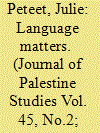

|
|
|
|
|
| Summary/Abstract |
This article explores the linguistic repertoires and conceptual categories that are discursive workhorses in the task of informing U.S. public opinion and shaping policy on Palestine. It situates language commodification in a modern settler-colonial context as it intersects with corporate public relations. The article probes two sites of knowledge production and circulation: the media and the academy. It argues that, ultimately, the media's discursive strategies are handmaidens of violence, enabling and legitimizing colonial relations of displacement and domination. Shifting to academic discourse, particularly anthropology, the article engages with a few selected terms to explore emerging and alternative ways of conceptually framing Palestine.
|
|
|
|
|
|
|
|
|
|
|
|
|
|
|
|
| 3 |
ID:
144597


|
|
|
|
|
| Summary/Abstract |
Outstanding nuclear scientist and leading Palestinian-American Mujid S. Kazimi died suddenly in July 2015. This tribute summarizes his professional career and his remarkable contribution to nuclear science, his involvement with Arab-American organizations, and the personal qualities he brought to a lifelong commitment to Palestine.
|
|
|
|
|
|
|
|
|
|
|
|
|
|
|
|
| 4 |
ID:
144596


|
|
|
|
|
| Summary/Abstract |
This special document is an original English translation of a 2015, thirty-three page (in Hebrew), Israel Defense Forces (IDF) strategy paper, marking the first time that the IDF has published an official account of its fundamental driving principles. An introductory essay by Ahmad Samih Khalidi, “On the Limitations of Military Doctrine,” places the strategy document in the context of Israel's failures in the 2006 Lebanon war. The document, itself headed by a short letter from Israeli chief of staff Lt. Gen. Gadi Eisenkot, encompasses a broad spectrum of grand strategy analysis, prediction, and recommendation, against a complex matrix of operational, tactical, and logistical measures. It comprises three main parts: first, a succinct “Strategy Document” that describes Israel's strategic and operational environment and that delineates the basic principles guiding its military actions (chapters 1–3); second, a description of the IDF's command structure and procedures (chapter 4); and third, the prescription of a series of follow-up steps (chapter 5). In brief bullet points, the strategy document covers national goals, threat perceptions, the domestic, regional, and international contexts, technical and technological challenges, the main functions and roles of the IDF, the different conditions (or “operating statuses”) for the use of force, the importance of cyberwarfare, intelligence, questions of legitimacy, issues of command and control, resource utilization, defense capabilities, special operations, and the priorities for five years. Israel's traditional concerns with the threat from Arab states are downgraded in favor of the threat posed by sub- or non- state actors (Hamas and Hezbollah), and “distant” players (Iran).
|
|
|
|
|
|
|
|
|
|
|
|
|
|
|
|
| 5 |
ID:
144592


|
|
|
|
|
| Summary/Abstract |
This article reflects on the body of knowledge that has been constructed around the Palestinian economy. It traces the paradigm shifts between the two most commonly used theoretical frameworks—neoliberalism and colonialism—and assesses their success in analyzing and explaining the determinants of Palestinian economic growth. The Zionist project itself as well as the significant disparities between the various Palestinian communities that exist (inside Israel, in the occupied territories, and in the diaspora) have figured unevenly or not at all in scholarly analyses. The paper argues that as a result, the scholarship on the Palestinian economy has been quite inconsistent. The discussion seeks to demonstrate that this inconsistency has compromised the ability of economists both to explain the failure of Palestinian development and to identify possible remedies.
|
|
|
|
|
|
|
|
|
|
|
|
|
|
|
|
| 6 |
ID:
144594
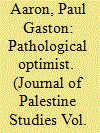

|
|
|
|
|
| Summary/Abstract |
This short biography of Dr. Eyad El Sarraj, the founder of the Gaza Community Mental Health Programme, describes his formative experiences under Israeli occupation, his education, and his professional life, including interactions with Palestinian and Israeli colleagues. El Sarraj's vision of collective resistance, his stubborn ‘pathological optimism,’ and his devotion to the dignity and well-being of his patients and the people of the Gaza Strip in the face of unrelenting Israeli state violence are colorfully described by his colleague and long-time friend Paul Aaron.
|
|
|
|
|
|
|
|
|
|
|
|
|
|
|
|
| 7 |
ID:
144591
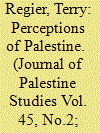

|
|
|
|
|
| Summary/Abstract |
Cultural norms and trends are often reflected in patterns of language use. This article explores cultural perceptions of Palestine and Palestinians in the English-speaking world, through two analyses of large linguistic datasets. The first analysis seeks to uncover current conceptions of participants in the Israel-Palestine conflict, by identifying words that are distinctively associated with those participants in modern English usage. The second analysis asks what historical-cultural changes led to these current conceptions. A general theme that emerges from these analyses is that a cultural shift appears to have occurred recently in the English-speaking world, marked by greater awareness of Palestinian perspectives on the conflict. Possible causes for such a cultural shift are also explored.
|
|
|
|
|
|
|
|
|
|
|
|
|
|
|
|
| 8 |
ID:
144589


|
|
|
|
|
| Summary/Abstract |
Nazareth, the only Palestinian city to survive the 1948 war intact, became the social, economic, and political hub of Palestinian life in the postwar period. As such, it provides the ideal setting to study early Palestinian responses to the creation of Israel. This paper reexamines the ambivalent relationship between Nazareth's political leadership and the newly established State of Israel to argue that the Palestinian citizens of Israel were neither traitors and collaborators, on the one hand, nor passively quiescent, on the other. Rather, as a new national minority, Palestinians overcame myriad forms of control as they negotiated the structural obstacles placed before them by their new overlords. Local Communist politicians, in particular, took a leading role to advocate on behalf of Nazarenes beset by the day-to-day hardships of poverty, hunger, displacement, and unemployment. The Israeli authorities harped on the Communist threat in response, echoing the Cold War rhetoric of the time.
|
|
|
|
|
|
|
|
|
|
|
|
|
|
|
|
| 9 |
ID:
144593
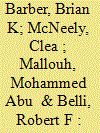

|
|
|
|
|
| Summary/Abstract |
This article summarizes a uniquely thorough study of the first generation of Palestinians to have lived the whole of their lives under occupation. Findings from group interviews and large, representative surveys of men and women from the West Bank, East Jerusalem, and the Gaza Strip in 2011 draw a complex portrait of day-to-day life both currently and historically, including: widespread political activism that they continue to prize; high levels of exposure to often demeaning political violence and restriction of movement; limited access to basic resources, low employment stability and poverty; high levels of social cohesion, but also of lack of safety, political instability, fear for the future, stress, and feeling broken. Most were not optimistic in 2011 about the peace process but remained, confident in their ability to manage what the future brings. The findings also show that each of the three territories has unique types and levels of challenges.
|
|
|
|
|
|
|
|
|
|
|
|
|
|
|
|
|
|
|
|
|